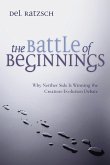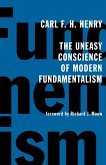In our supposedly secular age governed by reason and technology, fundamentalism has emerged as an overwhelming force in every major world religion. Why? This is the fascinating, disturbing question that bestselling author Karen Armstrong addresses in her brilliant new book The Battle for God. Writing with the broad perspective and deep understanding of human spirituality that won huge audiences for A History of God, Armstrong illuminates the spread of militant piety as a phenomenon peculiar to our moment in history. Contrary to popular belief, fundamentalism is not a throwback to some ancient form of religion but rather a response to the spiritual crisis of the modern world. As Armstrong argues, the collapse of a piety rooted in myth and cult during the Renaissance forced people of faith to grasp for new ways of being religious--and fundamentalism was born. Armstrong focuses here on three fundamentalist movements: Protestant fundamentalism in America, Jewish fundamentalism in Israel, and Islamic fundamentalism in Egypt and Iran--exploring how each has developed its own unique way of combating the assaults of modernity. Blending history, sociology, and spirituality, The Battle for God is a compelling and compassionate study of a radical form of religious expression that is critically shaping the course of world history.
In the late twentieth century, fundamentalism has emerged as one of the most powerful forces at work in the world, contesting the dominance of modern secular values and threatening peace and harmony around the globe. Yet it remains incomprehensible to a large number of people. In The Battle for God, Karen Armstrong brilliantly and sympathetically shows us how and why fundamentalist groups came into existence and what they yearn to accomplish. We see the West in the sixteenth century beginning to create an entirely new kind of civilization, which brought in its wake change in every aspect of life -- often painful and violent, even if liberating. Armstrong argues that one of the things that changed most was religion. People could no longer think about or experience the divine in the same way; they had to develop new forms of faith to fit their new circumstances. Armstrong characterizes fundamentalism as one of these new ways of being religious that have emerged in every major faith tradition. Focusing on Protestant fundamentalism in the United States, Jewish fundamentalism in Israel, and Muslim fundamentalism in Egypt and Iran, she examines the ways in which these movements, while not monolithic, have each sprung from a dread of modernity -- often in response to assault (sometimes unwitting, sometimes intentional) by the mainstream society. Armstrong sees fundamentalist groups as complex, innovative, and modern -- rather than as throwbacks to the past -- but contends that they have failed in religious terms. Maintaining that fundamentalism often exists in symbiotic relationship with an aggressive modernity, each impelling the other on to greater excess, she suggests compassion as a way to defuse what is now an intensifying conflict. BONUS: This edition contains an excerpt from Karen Armstrong's Twelve Steps to a Compassionate Life.
Hinweis: Dieser Artikel kann nur an eine deutsche Lieferadresse ausgeliefert werden.
In the late twentieth century, fundamentalism has emerged as one of the most powerful forces at work in the world, contesting the dominance of modern secular values and threatening peace and harmony around the globe. Yet it remains incomprehensible to a large number of people. In The Battle for God, Karen Armstrong brilliantly and sympathetically shows us how and why fundamentalist groups came into existence and what they yearn to accomplish. We see the West in the sixteenth century beginning to create an entirely new kind of civilization, which brought in its wake change in every aspect of life -- often painful and violent, even if liberating. Armstrong argues that one of the things that changed most was religion. People could no longer think about or experience the divine in the same way; they had to develop new forms of faith to fit their new circumstances. Armstrong characterizes fundamentalism as one of these new ways of being religious that have emerged in every major faith tradition. Focusing on Protestant fundamentalism in the United States, Jewish fundamentalism in Israel, and Muslim fundamentalism in Egypt and Iran, she examines the ways in which these movements, while not monolithic, have each sprung from a dread of modernity -- often in response to assault (sometimes unwitting, sometimes intentional) by the mainstream society. Armstrong sees fundamentalist groups as complex, innovative, and modern -- rather than as throwbacks to the past -- but contends that they have failed in religious terms. Maintaining that fundamentalism often exists in symbiotic relationship with an aggressive modernity, each impelling the other on to greater excess, she suggests compassion as a way to defuse what is now an intensifying conflict. BONUS: This edition contains an excerpt from Karen Armstrong's Twelve Steps to a Compassionate Life.
Hinweis: Dieser Artikel kann nur an eine deutsche Lieferadresse ausgeliefert werden.








